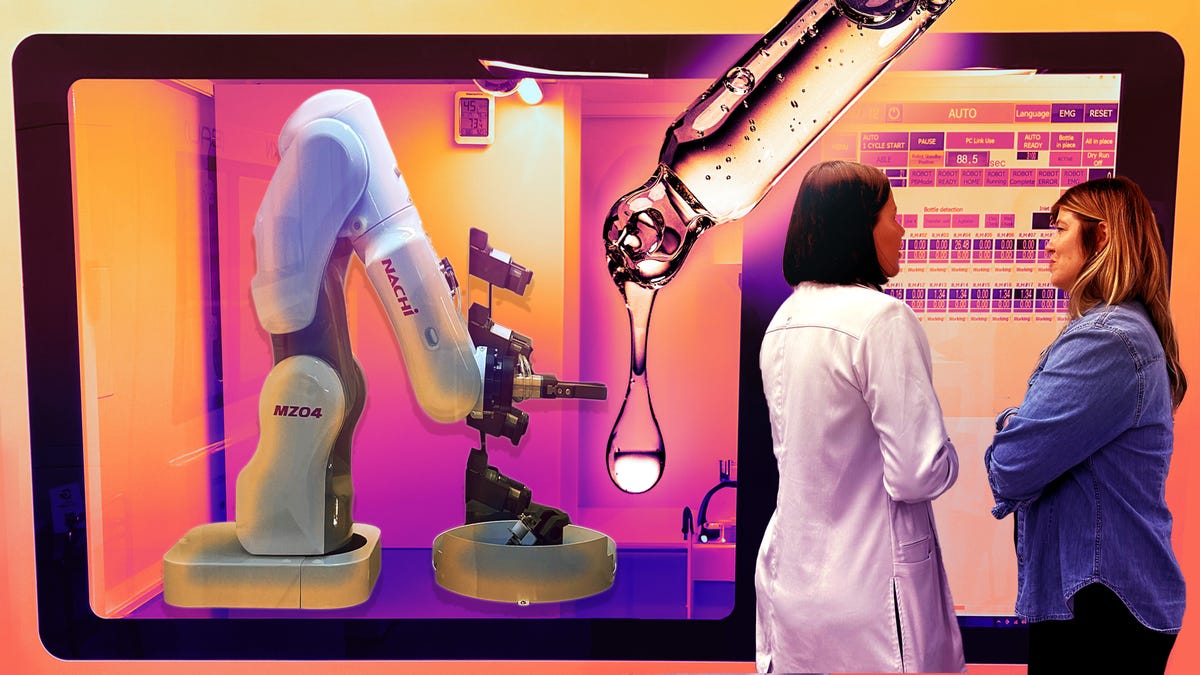On a gloomy November day, I drove from Boston to a large shopping complex in Beverly, Massachusetts. I walked down a long, narrow hallway and entered a medium-sized, clinical-looking white room full of robotic kiosks. I was there to visit SmartSKN Laboratoriesand these robots were going to create a hyper-personalized, entirely AI-created skincare line for me called K-AI.
I am always looking for the best and most effective products. I want powerful ingredients and efficient delivery systems. I want science, and so does everyone else, because of the oversaturated amount of innovation-based skincare in a A global market of 182 billion dollars. The demand is extraordinary. Unsurprisingly, this is where AI comes into the chat.
The role of AI in personalized beauty is not new. Skincare brands like Proven and haircare brands like Prose are already using AI algorithms to help consumers optimize their routines. SmartSKN is doing something I haven’t seen yet: leveraging AI for production itself, on demand – and if it gains traction, it could revolutionize the beauty industry, all while improving the health of our skin and reducing our carbon footprint.
At the Beverly Lab, Val Neicu, co-founder of SmartSKN Labs, shared his big dreams for the future of robots. First of all, I wanted to see what they could do.
How it works
It all starts with the Muilli AI Dermascope. This smart device examines the skin at the microscopic level using 60X magnification and captures high-resolution images of its surface for later analysis using artificial intelligence. Honestly, no one should experience the ego death of having their flaws so magnified, but alas, beauty is pain. Dermoscopic photography is accompanied by a measurement called bioimpedance measurement, which measures moisture and sebum levels in the skin and plays a vital role in the overall analysis.
The dermascope from SmartSKN laboratories which will develop my skin care products with the help of AI.
Then, in the SmartSKN app, I filled out a short questionnaire about my skin type, concerns and lifestyle. This helped the Smart SKN AI better understand my habits so it could effectively create my personalized skincare line. It is also very varied; this system has been trained on over 150,000 different skin profiles worldwide – all skin types, tones and genders – and is growing every day.
Finally, thanks to the trifecta of dermoscopic photography, bioimpedance measurement and skin health questionnaire, I had the results of my skin analysis. It measured sensitivity, pigmentation, wrinkles, redness, pore size, oil levels and dryness.
The line is composed of an essence/serum, an ampoule and a lotion. When finalizing each product at the robot kiosk, I had the choice to add additional ingredients that could amplify the benefits such as brightening or firming. Then the robot, which sort of resembles a bionic arm, got to work.
He chose the bottle, mixed and poured my unique formula into the bottle then screwed on the top. This all takes about five minutes. Then the robot dropped my unique product into a receptacle for me to collect, as if I had just won a toy from a claw machine. The robot also printed my labels, which feature a QR code with my unique profile, as well as instructions for entering the package.
Skin assessment results in the SmartSKN app.
Where do robots come from and where they are going
The AI robots, which SmartSKN has exclusive rights to, are made in Korea and use powerful ingredients popular in Korean skincare brands for each personalized formula. For those who don’t know, the K-Beauty industry was valued at 91.9 billion in 2022with an expected compound annual growth rate of 9.3% between 2023 and 2030. Korean skincare’s reputation for using high-quality, effective ingredients is legendary. You can explore SmartSKN’s Ingredient Rolodex here.
The SmartSKN team is extremely careful with its formulas, Neicu is clear about its place in the industry. “We’re not a skincare company, we’re a technology company,” she said. Robots can also make other products. Although they haven’t gotten into hair care yet, it’s not out of the question. Neicu told me that SmartSKN’s current offering is about “showing people what we can do.” In the next phase, they want to license the technology so that companies can use the Muilli analysis function and AI component for their own ingredients.
“Just as we developed a catalog of 150 ingredients contained in this machine to create our skin care lines, [other brands] could use their own proprietary ingredients,” she said. “They could take their line to the next level if they had their own adaptive bases and would be able to formulate formulas based on specific skin types.”
Neicu believes that skincare brands would experience less waste and higher loyalty if they could better personalize each formula. “A product can be great, but not great for me. The actives can work, but the base can be too greasy or too drying. The base is 90% of the experience of a product.” She spoke with passion, and as I listened, I couldn’t help but see the potential for not only smarter skincare, but also solutions for a more sustainable future.
“We don’t need more products. We need better products”
Don’t get me wrong: I love buy skin care. I collect serums like kids collect Funko Pop Toys. But I also recognize that unnecessary product collecting – product junkie culture, so to speak – is not good for our skin or the planet.
Think about the last time you walked into a beauty supply store, surrounded by walls and walls of products. What happens to the product that is not purchased? Next, think about what a brand needs to do to keep up with the market: make more products, not necessarily because there’s a hole in the market, but to survive. Novelty is a hell of a drug.
Neicu sees a more sustainable future. “Imagine that you enter a [beauty retailer] and there are no more shelves. Every company has a robot. There is no waste, they streamline their inventory, there is better management of the manufacturing process and they would be able to serve people better. »
It also made me think about my time and money. With each new product, I have a waiting period. Will this work for me? Sometimes I have a blast, sometimes I don’t. If this doesn’t work, have I wasted my money (again)? What should I do if I can’t return it? When I say the quiet part out loud, it seems borderline silly to me that in 2024 we’re just assuming a product could work for our incredibly unique skin type. We can customize our coffee and our cars, but when it comes to the health of our skin, we’ll just…keep guessing.
Products are formulated on demand based on your skin assessment with the aim of reducing waste.
“We invest money in a product because, what? Are the bottles pretty?” Neicu said. “Because an influencer told me to buy it? Because this company dropped a new product? It must be better.”
She also highlights the possibility of a sensitive skin outbreak. “Obviously, we know that there are many more products on the market than there were 20 years ago. What is directly proportional to the increase in the number of products is the health of women’s skin. Seventy percent of Americans report having sensitive skin. Neicu believes she caused acne and sensitive issues by using too many different products over the years.
“People are chasing products, especially with the social media influencer craze. There is a distinct lack of education, especially for the younger generation. Plus, it seems like every celebrity has their skincare line We don’t need more products. We need better products.
SmartSKN wants to simplify skincare for everyone. Personally, I want a routine that takes at least 5-10 minutes. (It’s “my time,” okay?) Smart SKN streamlines the skincare experience for those who don’t want a 6-12-step nighttime routine. Neicu said its consumers run the gamut, but pointed out that men, in particular, are attracted to both the innovation of the AI-produced diet and its simplicity.
A guided interface lets you have a say on product weight and other qualities.
Visit the lab or try it at home
SmartSKN is relatively new, which means they are still figuring out how to introduce their technology to people. Currently, the only way to experience the robots in person is to travel to Beverly. The company is working on setting up pop-ups in major cities. “People need to see how this is done,” Neicu said.
Your other option is to purchase the Muilli AI dermascope and download the SmartSKN app. It’s not cheap, but one of the benefits of owning a Muilli is that it tracks changes in your skin over time, adapting to things like seasonal changes and changes in lifestyle. With each scan, your personalized skincare range adapts to your current skin condition.
Robots know better
Since I started using my personalized treatments, what I notice the most is that my skin is perfectly balanced, whereas before it was a little oily some days and dry others. It’s worth noting that I use gentle, moisturizing cleansers; exfoliate regularly with chemical and physical exfoliants; use vitamin C daily and often finish my nighttime routine with a light oil to lock in moisture. I was doing all of this before my trip to SmartSKN labs.
Today my skin looks healthy, clear and hydrated, and I think I have some bots to thank for that.
The opinions expressed by CNET Voices contributors are their own.








